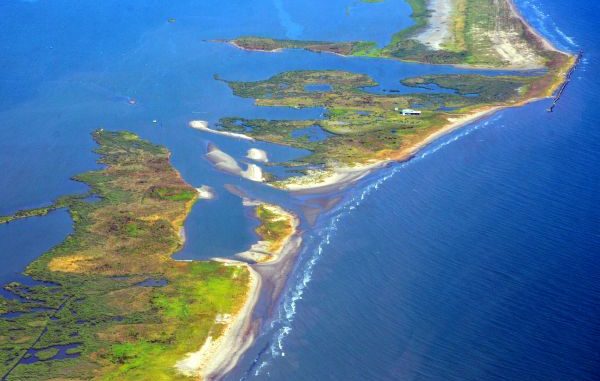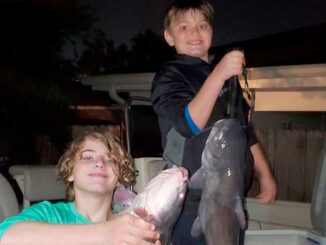
Raccoon Island, Vine Island in Barataria/Terrebonne basins hit particularly hard, BTNEP confirms.
It is well understood that the coastal areas of Louisiana are rapidly eroding. And the day-to-day erosion advances whenever storm events such as Hurricane Isaac batter the state’s coastal areas.
The Louisiana Department of Natural Resources reports that as more wetlands and coastal areas are lost to erosion the more upland parts of the state are exposed to severe weather.The DNR also reports that 60 percent of that state’s land loss occurs in the Barataria and Terrebonne basins. And those marshes took another hammering when slow-moving Hurricane Isaac chewed through the state in late August.
Barataria-Terrebonne National Estuary Program’s Public Involvement Coordinator Joseph Dantin is on the forefront of efforts to halt coastal erosion in the most vulnerable areas–the states many small barrier islands, and he told Louisiana Sportsman last week that his organization’s efforts to restore the outermost Barataria/Terrebone landmasses were hurt by Isaac.
BTNEP, a cooperative state and federal effort aimed at reserving and restoring wetlands and barrier islands to support ecosystems, was established in 1990 and focuses on 4.2 million acres in Southeast Louisiana.
In particular Dantin said damage by Isaac to Raccoon Island in the Isles Denieres Barrier Islands Refuge was devastating, with erosion from 2008‘s Hurricane Gustav (during which the island was split in two) only aggrevated.
Dantin has now taken to calling the landmasses East and West Raccoon islands.
In addition, nearby Vine Island in the same refuge was decimated by the storm. Dantin said BTNEP and Nicholl’s State University had a cooperative effort plan to plant vegetation on this spit of sand to slow down erosion, but that effort has been cancelled after Isaac lowered the elevation of the island.
“Hurricane Isaac really reworked the island,” Dantin said. “The elevation is considerably lower than what it was even a month ago. I am not saying we have completely abandoned the idea of planting the island, but at this point in time there is just not enough elevation there to even consider it.”
Dantin is hoping that his group can act quickly enough to keep West Raccoon Island from suffering a similar fate as Vine Island. While East Raccoon Island is well situated. with rocky terrain and plenty of vegetation to withstand major erosion, West Raccoon Island was severely damaged in Isaac and is need of plantings to keep erosion from occurring.
“The island that has been denuded of all vegetation,” Dantin said.
BTNEP is currently doing plantings of panic grass and railroad vine in hopes of reclaiming some of the eroded areas. The group plans to monitor the plantings and, if they succeed, plant more vegetation with the aim of providing added elevation.
“We are going to plant upward of 7,000 stems of panic grass, and we’ve got about 400 containers of railroad vines. Altogether I am going to try to cover somewhere around 4,000 to 5,000 linear feet,” Dantin explained. “I don’t think I am going to be able to cover it in two plantings, but we are going to be able to take care of a big chunk of it.”
As far as damage to wildlife areas on barrier islands Dantin said Isaac struck at the right time of year so disruption to the state’s wildlife populations were minimized.
“It took away some (bird) molting area; it definitely took away some possible nesting away,” he said. “Of course, we are talking about shorebirds, probably brown pelican nesting area, as well. “We’ve definitely seen some marsh destruction. We’ve definitely seen some coastal destruction.
“However, it hit in late September: As far as birds go, it was definitely the end of their nesting period.”
Dantin said that over the past 10 years BTNEP has led hundreds of different restorative projects across the region and that the coalition often relies on volunteers to help them plant.
“If there are involved parties who would love to volunteer for events, we would love to have them,” Dantin said.
If you would like to assist BTNEP in coastal recovery efforts, call Dantin at 985-228-0358 or visit www.btnep.org for more information.
